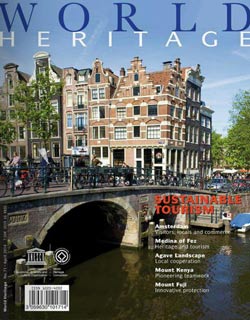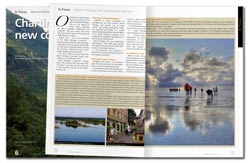To mark the 30th anniversary of the Convention Concerning the Protection of the World Cultural and Natural Heritage, UNESCO with the support of the Government of Italy, organized, from 14 to 16 November 2002, an International Congress to reflect on some of the main issues, achievements and challenges of the World Heritage mission.
Over 600 experts from around the world gathered at the Giorgio Cini Foundation on the island of San Giorgio in Venice, Italy, to discuss the evolution of the World Heritage Convention and consider its role for the future. In addition, some 400 experts gathered immediately prior to the Congress at nine associated workshops in different Italian cities to reflect on the major themes of the Congress. The nine workshops were:
- The Legal Tools for World Heritage Conservation, Siena
- Cultural Landscapes: the Challenges of Conservation, Ferrara
- Towards Innovative Partnerships for World Heritage, Venice
- Partnerships for World Heritage Cities, Urbino-Pesaro
- Monitoring World Heritage, Vicenza
- Partnerships to Conserve Nature and Biodiversity, Trieste
- The Challenge of World Heritage Education, Training and Research, Feltre
- World Heritage Site Management, Padua
- Mobilizing Young People for World Heritage, Treviso
This publication aims to reflect the discussions and debates around the specific themes as they were discussed over the two days of the workshop. The summary reports of each workshop are also available in the Congress proceedings publication.
Table of Contents
Preface by Francesco Bandarin
Introduction by Minja Yang
Position Paper
Safeguarding and Development of World Heritage Cities by Minja Yang & Jehanne Pharès
Opening Session
Official Welcome
- Massimo Galluzzi, Mayor of Urbino; Fabrizio Ago, Representative of the Italian Ministry of Foreign Affairs; Francesco Scoppola, Representative of the Italian Ministry of Culture; Paolo Avarello, President of the Istituto Nazionale di Urbanistica (Italy); Jean-Marie Vincent, Representative of the Government of France; Tamás Fejérdy, President of the World Heritage Committee; Irene Wiese von Ofen, President of the International Federation of Housing and Planning; Ray Bondin, President of CIVVIH-ICOMOS and Minja Yang, Deputy Director of the UNESCO World Heritage Centre
- The City as an Expression of Culture: the Case of 14th century Urbino Keynote speech by Leonardo Benevolo
- Partnerships for Urban Conservation Strategies by Enrico Fontanari
- Culture as a Vector for a Balanced Urban Development by Jean-Marie Vincent
Case Studies
Theme 1: Urban Identity – the Core & the Periphery
- Introduction by Yves Dauge
- Heritage Protection & Decentralization by Yves Dauge & Minja Yang
- Authenticity, Integrity & the World Heritage Convention by Jukka Jokilehto
- Protecting the Urban Morphology of Asian Cities by Minja Yang
- Urban Identity & Natural Environment – Venice and its Lagoon by Giorgio Lombardi
- Cultural Heritage & Urban Development Project for five Historic Cities in Lebanon by Anthony Bigio & Jade Tabet
- Integrating or Erasing the Past in Ouidah & Porto Novo (Benin) by Bachir Oloudé
- Multi-Ethnicity & Cultural Significance in Georgetown (Guyana) by Ron Van Oers
- Town Planning Project & Heritage: towards a New Approach by François Noisette
- Strategic Activities to Strengthen Urban Identity in Bergen (Norway) by Siri Myrvoll
- English Heritage by Peter de Figueiredo
- Inscription of Byblos on the World Heritage List, an Asset for Urban Centrality of Jbeil City (Lebanon) by Jehanne Pharès
Theme 2: Urban Culture for Social Development
- Introduction by Irene Wiese von Ofen
- Local Economy & Urban Conservation in Zabid (Yemen) by Hadi Saliba
- Resource Mobilization in Sana’a & Zabid (Yemen) by Gianni Brizzi
- Social Housing & Urban Conservation in Istanbul Historic Peninsula (Turkey) by Nuran Zeren Gülersoy
- Events-oriented Rehabilitation - a New Impetus for Barcelona (Spain) by Xavier Casas-I-Masjoan
- Urban Culture & Social Development: Looking for Values by Domenico Patassini
- The Role of Culture-focused Projects in a Decentralized Co-operation Programme – the European Union Asia Urbs Programme by Vincent Rotgé
- Heritage Conservation Efforts in Georgetown, Penang (Malaysia) by Tan Thean Siew
Theme 3: Historic Centres towards Modernity
- Introduction by Jean Bakolé
- Cultural Tourism & Development in the Six Canal Towns of the Lower Yangtze River (China) by Zhou Jian
- Inter-Communality, Cultural Tourism & Development in the Six Canal Towns of the Lower Yangtze (China) by Alain Marinos
- Decentralization, Assistance, Investments & Future of the Historic Centres of Africa by Jean-Pierre Elong Mbassi
- Urban Mobility & Conservation by Roland Ries
- Historic Cities Moving towards Modernity by Beatriz Barco
- Historic Towns, Sustainable Development & Tourism by Tamás Fejérdy
- Cultural Heritage in Urban Projects of GTZ by Ursula Eigel
- Harmonious Collaboration between Development & Preservation – Ajanta & Ellora Project (India) by Yoshio Wada
- Partnership Programme of the French Development Agency by Thierry Paulais
- Partnership Experiences for World Heritage Cities by Enrico Fontanari & Domenico Patassini
Discussion Highlights by Emmanuelle Robert, Jehanne Pharès & Alexandra Sauvage - Theme 1: Urban Identity – the Core & the Periphery
- Theme 2: Urban Culture for Social Development
- Theme 3: Historic Centres towards Modernity
Recommendations
Annexes
- Annex A: Agenda of the Workshop
- Annex B: Urban Heritage on the World Heritage List
- Annex C: Acronyms








